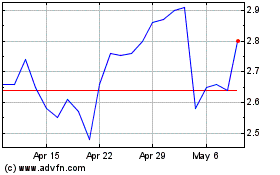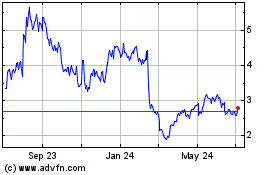Travelport Owners, Lenders Settle $1 Billion Debt Dispute -- Update
September 17 2020 - 4:55PM
Dow Jones News
By Andrew Scurria
Elliott Management Corp.'s Travelport Worldwide Ltd. reached a
restructuring agreement that unwinds a disputed $1 billion
shareholder rescue package and ends a standoff with some of Wall
Street's biggest debt buyers, people familiar with the matter
said.
The settlement cools tensions between Travelport's top lenders
and its private-equity backers Elliott and Siris Capital Group LLC,
resolving one of the highest-profile fights to break out between
investors in companies hit hard by the Covid-19 pandemic. Elliott
declined to comment.
U.K.-based Travelport tried to weather the coronavirus with a
financing package supplied by its owners, which had taken it
private in 2018 and were eager to protect their stakes. One of
Elliott's biggest private-equity bets, Travelport competes with
Amadeus IT Group SA and Sabre Corp. to link airlines with booking
websites and travel agents, a business that has slowed amid
government-imposed travel restrictions and passengers' fear of
contagion.
To secure the rescue loan, the company shifted
intellectual-property assets out of the lenders' grasp to serve as
collateral for Elliott and Siris. Although Travelport got
much-needed cash to help survive the pandemic, lenders including
Blackstone Group Inc., Bain Capital LP and Mudrick Capital
Management LP were upset about losing access to valuable corporate
assets.
These asset-shifting maneuvers have been increasingly popular
among struggling private-equity-backed companies since J.Crew Group
Inc. pioneered the strategy in 2016. Taking advantage of flexible
credit agreements, portfolio companies have moved brands,
trademarks and other intellectual property out of the reach of
lenders and used the assets to secure financial lifelines elsewhere
and avoid bankruptcy.
The groundwork for these disputes was laid in recent years as
debt buyers, hoping to squeeze out meager returns from picked-over
debt markets, accepted fewer and fewer protections when investing.
Credit investors sometimes have fought back, with varying degrees
of success.
Lenders said Travelport had tripped a debt default by stripping
away property that should have stayed available to satisfy their
claims. When they threatened to take action against Travelport, the
company sued them, arguing it had complied with its debt agreements
and struck a prudent deal to get through the downturn in air
travel.
Kirkland & Ellis LLP, one of the most powerful law firms in
finance, soon resigned from representing the company in a sign of
how acrimonious the dispute had become. Travelport warned it could
be forced into a defensive bankruptcy. It later reached an interim
deal to keep lenders at bay and lay the groundwork for
negotiations.
Under the settlement, lenders agreed to backstop $500 million in
fresh loans, backed by the intellectual property that had been
pledged to Elliott and Siris, people familiar with the matter
said.
First-lien lenders are accepting a discount of 10 cents on the
dollar on some of their debt claims, while second-lien lenders are
taking a 25-cent discount, reducing Travelport's roughly $3 billion
debt load, these people said. The rescue loan supplied by Elliott
and Siris is being repaid, the people said.
Write to Andrew Scurria at Andrew.Scurria@wsj.com
(END) Dow Jones Newswires
September 17, 2020 16:40 ET (20:40 GMT)
Copyright (c) 2020 Dow Jones & Company, Inc.
Sabre (NASDAQ:SABR)
Historical Stock Chart
From Mar 2024 to Apr 2024

Sabre (NASDAQ:SABR)
Historical Stock Chart
From Apr 2023 to Apr 2024
